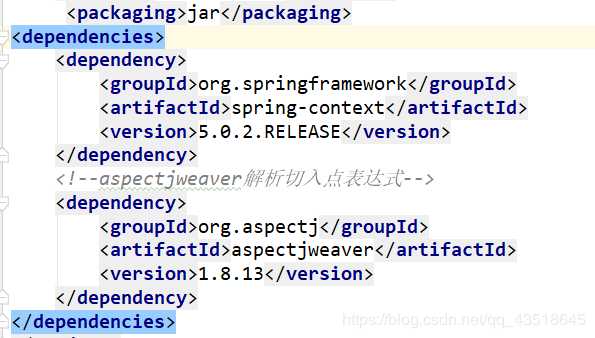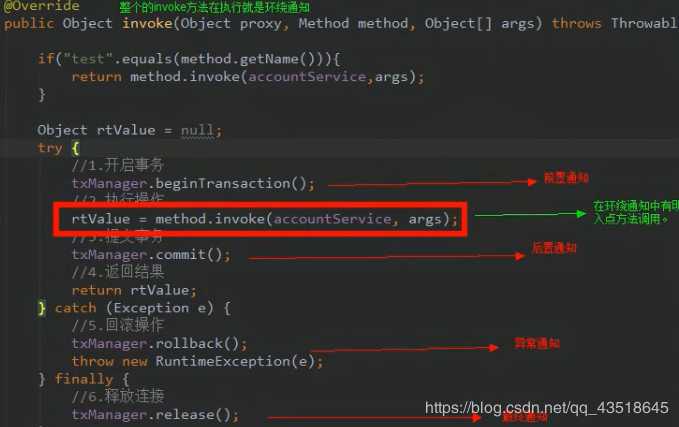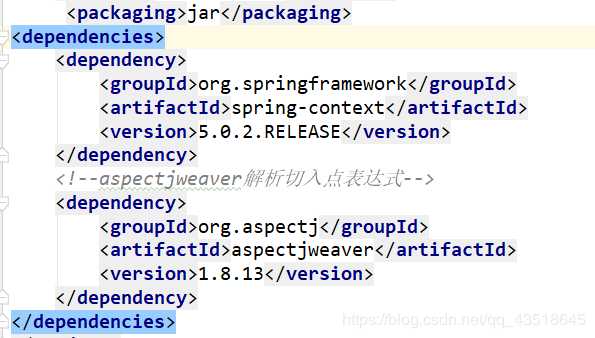标签:通用 roc 应用 tar www 面向 内容 aspectj 就是
1.1、什么是AOP
 简单的说它就是把我们程序重复的代码抽取出来,在需要执行的时候,使用动态代理的技术,在不修改源码的基础上,对我们的己有方法进行增强。
简单的说它就是把我们程序重复的代码抽取出来,在需要执行的时候,使用动态代理的技术,在不修改源码的基础上,对我们的己有方法进行增强。
1.2、AOP的作用及优势
作用:
在程序运行期间,不修改源码对己有方法进行增强。
优势:
减少重复代码
提高开发效率
维护方便
1.3、AOP的实现方式
使用动态代理技术
1.4、具体应用
动态代理模式:https://blog.csdn.net/qq_43518645/article/details/103473336
注:spring中的AOP就是通过配置的方式实现上文动态代理所实现的功能。
2.1、AOP相关术语
Joinpoint(连接点):
所谓连接点是指那些被拦截到的点。在spring中,这些点指的是方法,因为spring只支持方法类型的连接点。
Pointcut(切入点):
所谓切入点是指我们要对哪些Joinpoint进行拦截的定义。
Advice(通知/增强):
所谓通知是指拦截到Joinpoint之后所要做的事情就是通知。
通知的类型:前置通知,后置通知,异常通知,最终通知,环绕通知。
Introduction(引介):
引介是一种特殊的通知在不修改类代码的前提下,Introduction可以在运行期为类动态地添加一些方法或Field。
Target(目标对象):
代理的目标对象。
Weaving(织入):
是指把增强应用到目标对象来创建新的代理对象的过程。
spring采用动态代理织入,而AspectJ采用编译期织入和类装载期织入。
Proxy(代理):
一个类被AOP织入增强后,就产生一个结果代理类。
Aspect(切面):
是切入点和通知(引介)的结合。
2.2、学习Spring中的AOP要明确的事
a、开发阶段(我们做的)
编写核心业务代码(开发主线):大部分程序员来做,要求熟悉业务需求。
把公用代码抽出来,制作成通知。(开发阶段最后再做):AOP编程人员来做。
在配置文件中,声明切入点与通知间的关系,即切面。:AOP编程人员来做。
b、运行阶段(Spring框架完成的)
Spring框架监控切入点方法的执行。一旦监控到切入点方法被运行,使用代理机制,动态创建目标对象的代理对象,根据通知类别,在代理对象的对应位置,将通知对应的功能织入,完成完整的代码逻辑运行。
3、Spring基于XML的AOP
模拟一下前置通知
导入坐标

编写模拟类
/**
* 账户的业务层接口
* **/
public interface IAccountService {
/**
* 模拟保存账户
* **/
void saveAccount();
/**
* 模拟更新账户
* **/
void updateAccount(int i);
/**
* 删除账户
* **/
int deleAccount();
}
/**
* 账户的业务层实现类
* **/
public class AccountServiceImpl implements IAccountService {
public void saveAccount() {
System.out.println("执行了保存");
}
public void updateAccount(int i) {
System.out.println("执行了更新"+i);
}
public int deleAccount() {
System.out.println("执行了删除");
return 0;
}
}
/**
* 用于记录日志的工具类,它里面提供了公共的代码
* **/
public class Loggr {
/**
* 用于打印日志:计划让其在切入点方法执之前执行(切入点方法就是业务层方法)
* **/
public void printLog(){
System.out.println("Logger类中的printLog方法开始记录日志了。");
}
}
编写XML配置文件
<?xml version="1.0" encoding="UTF-8"?>
<beans xmlns="http://www.springframework.org/schema/beans"
xmlns:xsi="http://www.w3.org/2001/XMLSchema-instance"
xmlns:aop="http://www.springframework.org/schema/aop"
xsi:schemaLocation="http://www.springframework.org/schema/beans
https://www.springframework.org/schema/beans/spring-beans.xsd
http://www.springframework.org/schema/aop
https://www.springframework.org/schema/aop/spring-aop.xsd">
<!--配置spring的Ioc,把service对象配置进来-->
<bean id="accountService" class="com.itheima.service.impl.AccountServiceImpl"></bean>
<!--spring中基于XML的AOP配置步骤
1、把通知bean也交给spring来管理
2、使用aop:config标签表明开始AOP的配置
3、使用aop:aspect标签表明配置切面
id属性:是给切面提供一个唯一标识
ref属性:是指定通知类bean的ID
4、在aop:aspect标签内部使用对应标签来配置通知的类型
我们现在示例是让printLog方法在切入点方法执行之前,所以是前置通知
aop:before 表示配置前置通知
method属性:用于指定Logger类中哪个方式是前置通知
pointcut属性:用于指定切入点表达式,该表达式的含义指的是对业务层中哪些方法增强
切入点表达式的写法:
关键字:execution(表达式)
表达式:
访问修饰符 返回值 包名.包名.包名...类名.方法名(参数列表)
标准的表达式写法:
public void com.cn.hsy.service.impl.AccountServiceImpl.saveAccount()
访问修饰符可以省略:
void com.cn.hsy.service.impl.AccountServiceImpl.saveAccount()
返回值可以使用通配符,表示任意返回值
* com.cn.hsy.service.impl.AccountServiceImpl.saveAccount()
包名可以使用通配符,表示任意包.但是有几级包,就需要写几个*
* *.*.*.*.*.AccountServiceImpl.saveAccount()
包名可以使用..表示当前包及其子包
* *..AccountServiceImpl.saveAccount()
类名和方法名都可以实现通配
* *..*.*()
方法参数列表:
可以直接写数据类型:
基本类型直接写名称 int
引用类型写包名.类名的方式 java.lang.String
类型也可以使用通配符* 但必须有参数
类型也可以使用..表示有无参数均可,有参数可以是任意类型
全通配写法:
* *..*.*(..)
实际开发中切入点表达式的通常写法:
切到业务层实现类下的所有方法
* com.xxx.service.impl.*.*(..)
-->
<!--配置Logger类-->
<bean id="logger" class="com.itheima.service.utils.Loggr"></bean>
<!--配置AOP-->
<aop:config>
<!--配置切面-->
<aop:aspect id="logAdvice" ref="logger">
<!--配置通知类型,并且建立通知方法和切入点方法的关联-->
<aop:before method="printLog" pointcut="execution(public void com.itheima.service.impl.AccountServiceImpl.saveAccount())"></aop:before>
</aop:aspect>
</aop:config>
</beans>
编写测试类进行测试
/**
* 测试AOP的配置
* **/
public class AOPTest {
public static void main(String[] args) {
//1.获取容器
ApplicationContext ac=new ClassPathXmlApplicationContext("bean.xml");
//2.获取对象
IAccountService as=(IAccountService) ac.getBean("accountService");
//3.执行方法
as.saveAccount();
}
}
结果:

可以看到已经在不修改源码对己有方法进行增强
4.1、四种常用通知类型
将Loggr类代码进行如下修改:
public class Loggr {
/**
* 前置通知
* **/
public void beforeprintLog(){
System.out.println("前置通知Logger类中的beforeprintLog方法开始记录日志了。");
}
/**
* 后置通知
* **/
public void afterReturningprintLog(){
System.out.println("后置通知Logger类中的afterReturningprintLog方法开始记录日志了。");
}
/**
* 异常通知
* **/
public void afterThorwingprintLog(){
System.out.println("异常通知Logger类中的afterThorwingprintLog方法开始记录日志了。");
}
/**
* 最终通知
* **/
public void afterprintLog(){
System.out.println("最终通知Logger类中的afterprintLog方法开始记录日志了。");
}
}
将XML配置文件进行如下修改:
<?xml version="1.0" encoding="UTF-8"?>
<beans xmlns="http://www.springframework.org/schema/beans"
xmlns:xsi="http://www.w3.org/2001/XMLSchema-instance"
xmlns:aop="http://www.springframework.org/schema/aop"
xsi:schemaLocation="http://www.springframework.org/schema/beans
https://www.springframework.org/schema/beans/spring-beans.xsd
http://www.springframework.org/schema/aop
https://www.springframework.org/schema/aop/spring-aop.xsd">
<!--配置spring的Ioc,把service对象配置进来-->
<bean id="accountService" class="com.itheima.service.impl.AccountServiceImpl"></bean>
<!--配置Logger类-->
<bean id="logger" class="com.itheima.service.utils.Loggr"></bean>
<!--配置AOP-->
<aop:config>
<!--配置切面-->
<aop:aspect id="logAdvice" ref="logger">
<!--配置前置通知 在切入点方法执行之前执行-->
<aop:before method="beforeprintLog" pointcut="execution(public void com.itheima.service.impl.AccountServiceImpl.saveAccount())"></aop:before>
<!--配置后置通知 在切入点方法正常执行之后执行-->
<aop:after-returning method="afterReturningprintLog" pointcut="execution(public void com.itheima.service.impl.AccountServiceImpl.saveAccount())"></aop:after-returning>
<!--配置异常通知 在切入点方法执行产生异常之后执行-->
<aop:after-throwing method="afterThorwingprintLog" pointcut="execution(public void com.itheima.service.impl.AccountServiceImpl.saveAccount())"></aop:after-throwing>
<!--配置最终通知 无论切入点方法是否正常执行它都会在其后面执行-->
<aop:after method="afterprintLog" pointcut="execution(public void com.itheima.service.impl.AccountServiceImpl.saveAccount())"></aop:after>
</aop:aspect>
</aop:config>
</beans>
结果:

4.2、通用化切面表达式
将XML配置文件进行如下修改:
<?xml version="1.0" encoding="UTF-8"?>
<beans xmlns="http://www.springframework.org/schema/beans"
xmlns:xsi="http://www.w3.org/2001/XMLSchema-instance"
xmlns:aop="http://www.springframework.org/schema/aop"
xsi:schemaLocation="http://www.springframework.org/schema/beans
https://www.springframework.org/schema/beans/spring-beans.xsd
http://www.springframework.org/schema/aop
https://www.springframework.org/schema/aop/spring-aop.xsd">
<!--配置spring的Ioc,把service对象配置进来-->
<bean id="accountService" class="com.itheima.service.impl.AccountServiceImpl"></bean>
<!--配置Logger类-->
<bean id="logger" class="com.itheima.service.utils.Loggr"></bean>
<!--配置AOP-->
<aop:config>
<!--配置切面-->
<aop:aspect id="logAdvice" ref="logger">
<!--配置前置通知 在切入点方法执行之前执行-->
<aop:before method="beforeprintLog" pointcut-ref="pt1"></aop:before>
<!--配置后置通知 在切入点方法正常执行之后执行-->
<aop:after-returning method="afterReturningprintLog" pointcut-ref="pt1"></aop:after-returning>
<!--配置异常通知 在切入点方法执行产生异常之后执行-->
<aop:after-throwing method="afterThorwingprintLog" pointcut-ref="pt1"></aop:after-throwing>
<!--配置最终通知 无论切入点方法是否正常执行它都会在其后面执行-->
<aop:after method="afterprintLog" pointcut-ref="pt1"></aop:after>
<!--配置切入点表达式 id属性用于指定表达式的唯一标识 expression属性用于指定表达式内容
此标签写在aop:aspect标签内部只能当前切面使用。
它还可以写在aop:aspect外面,此时就变成了所有切面可用。若放在外面,此便签放在aop:config里面
-->
<aop:pointcut id="pt1" expression="execution(public void com.itheima.service.impl.AccountServiceImpl.saveAccount())"/>
</aop:aspect>
</aop:config>
</beans>
4.3、Spring中的环绕通知
XML配置文件进行如下修改:
<?xml version="1.0" encoding="UTF-8"?>
<beans xmlns="http://www.springframework.org/schema/beans"
xmlns:xsi="http://www.w3.org/2001/XMLSchema-instance"
xmlns:aop="http://www.springframework.org/schema/aop"
xsi:schemaLocation="http://www.springframework.org/schema/beans
https://www.springframework.org/schema/beans/spring-beans.xsd
http://www.springframework.org/schema/aop
https://www.springframework.org/schema/aop/spring-aop.xsd">
<!--配置spring的Ioc,把service对象配置进来-->
<bean id="accountService" class="com.itheima.service.impl.AccountServiceImpl"></bean>
<!--配置Logger类-->
<bean id="logger" class="com.itheima.service.utils.Loggr"></bean>
<!--配置AOP-->
<aop:config>
<!--配置切入点表达式 id属性用于指定表达式的唯一标识 expression属性用于指定表达式内容
此标签写在aop:aspect标签内部只能当前切面使用。
它还可以写在aop:aspect外面,此时就变成了所有切面可用。若放在外面,此便签放在aop:config里面
-->
<aop:pointcut id="pt1" expression="execution(public void com.itheima.service.impl.AccountServiceImpl.saveAccount())"/>
<!--配置切面-->
<aop:aspect id="logAdvice" ref="logger">
<!--配置环绕通知 详细的注释请看Logger类中-->
<aop:around method="aroundPringLog" pointcut-ref="pt1"></aop:around>
</aop:aspect>
</aop:config>
</beans>
将Loggr类代码进行如下修改:
public class Loggr {
/**
* 环绕通知
*
* **/
public void aroundPringLog(){
System.out.println("Logger类中的aroundPringLog方法开始记录日志了。");
}
}
结果:
问题:当我们配置了环绕通知后,切入点方法没有执行,而通知方法执行了。
原因:
动态代理:

此处代码:

分析:通过对比动态代理中的环绕通知代码,发现动态代理的环绕通知有明确的切入点方法调用,而此处代码没有。
解决:Spring框架为我们提供了一个接口:ProceedingJoinPoint。该接口有一个方法proceed(),此方法就相当于明确调用切入点方法。该接口可以作为环绕通知的方法参数,在程序执行时,spring框架会提供该接口的实现类供我们使用。
将Logger类进行如下修改:
/**
* 用于记录日志的工具类,它里面提供了公共的代码
* **/
public class Loggr {
/**
* 环绕通知
*
* **/
public Object aroundPringLog(ProceedingJoinPoint pp){
Object rtvalue=null;
try {
Object[]args=pp.getArgs(); //得到方法执行所需的参数
System.out.println("Logger类中的aroundPringLog方法开始记录日志了。前置");
rtvalue=pp.proceed(args); //明确调用业务层(切入)方法
System.out.println("Logger类中的aroundPringLog方法开始记录日志了。后置");
return rtvalue;
}catch (Throwable t){
System.out.println("Logger类中的aroundPringLog方法开始记录日志了。异常");
throw new RuntimeException(t);
}finally {
System.out.println("Logger类中的aroundPringLog方法开始记录日志了。最终");
}
}
}
结果:

Spring中的环绕通知:Spring框架提供的一个可以在代码中手动控制增加方法何时执行的方式。
5、Spring基于注解的AOP配置
导入坐标

编写XML配置文件
<?xml version="1.0" encoding="UTF-8"?>
<beans xmlns="http://www.springframework.org/schema/beans"
xmlns:xsi="http://www.w3.org/2001/XMLSchema-instance"
xmlns:aop="http://www.springframework.org/schema/aop"
xmlns:context="http://www.springframework.org/schema/context"
xsi:schemaLocation="http://www.springframework.org/schema/beans
https://www.springframework.org/schema/beans/spring-beans.xsd
http://www.springframework.org/schema/aop
https://www.springframework.org/schema/aop/spring-aop.xsd
http://www.springframework.org/schema/context
https://www.springframework.org/schema/context/spring-context.xsd">
<!--配置Spring创建容器时要扫描的包-->
<context:component-scan base-package="com.itheima"></context:component-scan>
<!--配置spring开启注解AOP的支持-->
<aop:aspectj-autoproxy></aop:aspectj-autoproxy>
</beans>
编写业务层接口
/**
* 账户的业务层接口
* **/
public interface IAccountService {
/**
* 模拟保存账户
* **/
void saveAccount();
/**
* 模拟更新账户
* **/
void updateAccount(int i);
/**
* 删除账户
* **/
int deleAccount();
}
编写业务层的实现类
/**
* 账户的业务层实现类
* **/
@Service("accountService")
public class AccountServiceImpl implements IAccountService {
public void saveAccount() {
System.out.println("执行了保存");
}
public void updateAccount(int i) {
System.out.println("执行了更新"+i);
}
public int deleAccount() {
System.out.println("执行了删除");
return 0;
}
}
编写日志类
/**
* 用于记录日志的工具类,它里面提供了公共的代码
* **/
@Component("logger")
@Aspect //表示当前类是一个切面类
public class Loggr {
@Pointcut("execution(public void com.itheima.service.impl.AccountServiceImpl.saveAccount())")
private void pt1(){}
/**
* 前置通知
* **/
@Before("pt1()")
public void beforeprintLog(){
System.out.println("前置通知Logger类中的beforeprintLog方法开始记录日志了。");
}
/**
* 后置通知
* **/
@AfterReturning("pt1()")
public void afterReturningprintLog(){
System.out.println("后置通知Logger类中的afterReturningprintLog方法开始记录日志了。");
}
/**
* 异常通知
* **/
@AfterThrowing("pt1()")
public void afterThorwingprintLog(){
System.out.println("异常通知Logger类中的afterThorwingprintLog方法开始记录日志了。");
}
/**
* 最终通知
* **/
@After("pt1()")
public void afterprintLog(){
System.out.println("最终通知Logger类中的afterprintLog方法开始记录日志了。");
}
/**
* 环绕通知
*
* **/
/*public Object aroundPringLog(ProceedingJoinPoint pp){
Object rtvalue=null;
try {
Object[]args=pp.getArgs(); //得到方法执行所需的参数
System.out.println("Logger类中的aroundPringLog方法开始记录日志了。前置");
rtvalue=pp.proceed(args); //明确调用业务层(切入)方法
System.out.println("Logger类中的aroundPringLog方法开始记录日志了。后置");
return rtvalue;
}catch (Throwable t){
System.out.println("Logger类中的aroundPringLog方法开始记录日志了。异常");
throw new RuntimeException(t);
}finally {
System.out.println("Logger类中的aroundPringLog方法开始记录日志了。最终");
}
}*/
}
编写测试类
/**
* 测试AOP的配置
* **/
public class AOPTest {
public static void main(String[] args) {
//1.获取容器
ApplicationContext ac=new ClassPathXmlApplicationContext("bean.xml");
//2.获取对象
IAccountService as=(IAccountService) ac.getBean("accountService");
//3.执行方法
as.saveAccount();
}
}
结果:
个人建议:若使用注解配置的话,最好还是使用环绕通知。四种常用通知的顺序可以自己代码来控制。
注:笔者学习Spring随笔笔记,水平有限,欢迎指出问题。
AOP面向切面编程
标签:通用 roc 应用 tar www 面向 内容 aspectj 就是
原文地址:https://www.cnblogs.com/aimaogoudexiaohao/p/12019069.html
 简单的说它就是把我们程序重复的代码抽取出来,在需要执行的时候,使用动态代理的技术,在不修改源码的基础上,对我们的己有方法进行增强。
简单的说它就是把我们程序重复的代码抽取出来,在需要执行的时候,使用动态代理的技术,在不修改源码的基础上,对我们的己有方法进行增强。







